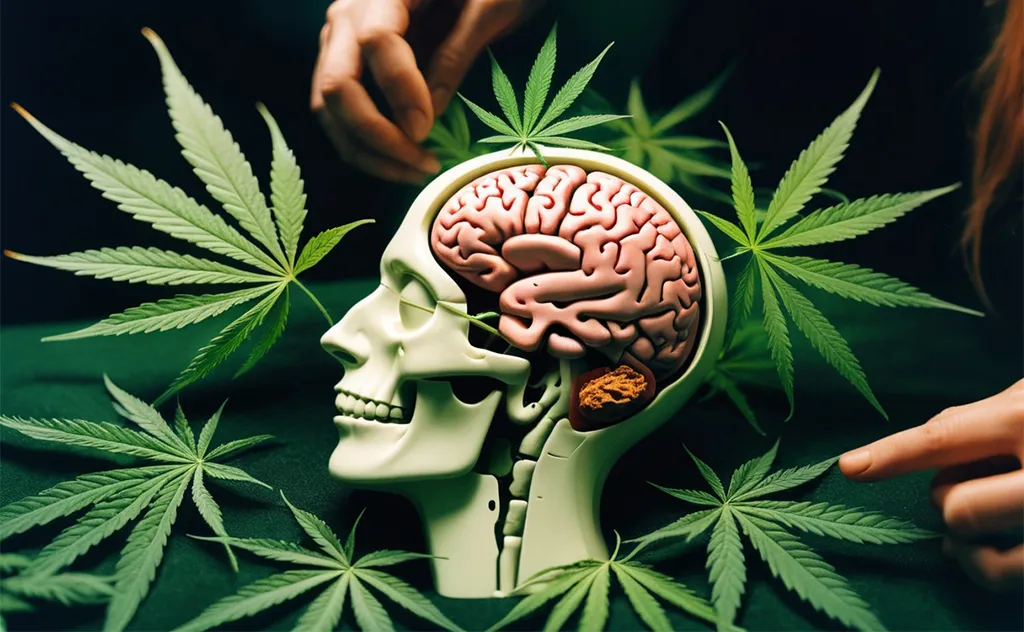What is the real relationship between CBD and the brain? And, more importantly, between CBD and memory? Is it the alteration that many associate with the psychoactive effects of THC or perhaps there is something more? A real physical benefit that allows the body to function better, to be more balanced and in harmony?
Cannabidiol, better known as CBD, has gained increasing attention in the field of scientific research and alternative medicine for its alleged therapeutic properties. One of the most fascinating and debated questions concerns its impact on memory and cognitive functions.
In a world where loss of attention, and sometimes memory, has become a growing concern, understanding how natural substances such as CBD can affect this crucial aspect of our health is crucial.
Many continue to associate CBD with cannabis and the plant’s psychoactive properties, which is why it is important to distinguish CBD from THC, the real psychoactive active ingredient.
Unlike THC, CBD does not produce psychotropic effects typical of marijuana. Instead, much research suggests that CBD can have positive effects on memory and cognitive functions.
Preclinical studies have shown that CBD may have neuroprotective effects, protecting the brain from damage and reducing inflammation that can impair cognitive function.
This is why in this article we want to explore in a more in-depth and honest way the existing research on the relationship between CBD and memory, analysing the most recent clinical and preclinical studies in order to better understand if and how CBD can influence our ability to remember and learn.
-
Product on sale
 CBD Oil 15% (1500mg) Full SpectrumPrice range: £31.20 through £51.20From 1,71 €/gr
CBD Oil 15% (1500mg) Full SpectrumPrice range: £31.20 through £51.20From 1,71 €/gr -
Product on sale
 CBD Oil 25% (2500mg) Full SpectrumPrice range: £47.20 through £67.20From 2,24 €/gr
CBD Oil 25% (2500mg) Full SpectrumPrice range: £47.20 through £67.20From 2,24 €/gr -
Product on sale
 CBD Oil 30% (3000mg) Full SpectrumPrice range: £55.20 through £75.20From 2,51 €/gr
CBD Oil 30% (3000mg) Full SpectrumPrice range: £55.20 through £75.20From 2,51 €/gr
Can CBD help memory?
CBD’s role in aiding memory is still a subject of debate and research. However, some animal studies and preliminary human research suggest that CBD may have neuroprotective effects, which means it could help protect the brain from damage and potentially improve memory and cognitive function.
CBD is in fact known for its anti-inflammatory and antioxidant properties, which could help reduce inflammation and oxidative stress in the brain, factors that are associated with cognitive decline.
Furthermore, research suggests that CBD may improve certain aspects of memory, such as working memory or the ability to recall information.
Consider that the effect of CBD on memory may vary depending on several factors, including the dose used, the composition chosen, the frequency of intake, the method of administration and the individual characteristics of each individual.
Therefore, the more information you have about CBD and memory, the more you can make informed use of the product to achieve the desired results.
Attention challenge and cognitive impairment
Modern society presents numerous challenges to attention and cognitive function, often related to changes in lifestyle, environment and use of technology.
Constant access to information via the Internet, social media and mobile devices can cause cognitive overload. This can lead to concentration difficulties, as the constant switching between different tasks and information sources can make it difficult to maintain focus on a single task, and mental fatigue, as the continuous processing of new information can tire the brain, reducing the capacity for critical thinking and memorisation.
The pressure to handle multiple tasks simultaneously, so-called multitasking, can impair the quality of attention and cognitive performance. Contrary to popular belief, multitasking can slow down task completion and increase the risk of errors. In addition, frequently switching between tasks can interfere with the ability to transfer information from short-term to long-term memory.
Sleep is also crucial for memory consolidation and cognitive functioning. Sleep deprivation, which is common in modern society, can lead to attention deficits and memory impairment because lack of sleep can interfere with the brain’s ability to consolidate memories.
Let us not forget that chronic stress can also have significant negative effects on the brain. In particular, prolonged stress can damage the hippocampus, a brain region critical for memory and learning. In addition, high levels of the stress hormone cortisol are associated with reduced cognitive capacity and memory impairment.
And what about a sedentary lifestyle? That contributes to reduced cerebral blood flow and increased risk of dementia. Diet and nutrition also affect cognitive impairment, especially nutritional deficits and diets high in sugar and fat.
-
Product on sale
 CBD oil 15% (1500mg) Broad SpectrumPrice range: £31.20 through £51.20From 1,71 €/gr
CBD oil 15% (1500mg) Broad SpectrumPrice range: £31.20 through £51.20From 1,71 €/gr -
Product on sale
 CBD oil 25% (2500mg) Broad SpectrumPrice range: £47.20 through £67.20From 2,24 €/gr
CBD oil 25% (2500mg) Broad SpectrumPrice range: £47.20 through £67.20From 2,24 €/gr -
Product on sale
 CBD oil 5% (500mg) Broad SpectrumPrice range: £14.25 through £33.00From 1,10 €/gr
CBD oil 5% (500mg) Broad SpectrumPrice range: £14.25 through £33.00From 1,10 €/gr
CBD impact on the human brain
The systematic review on the impact of cannabidiol on human brain function published in PubMed examines the impact of CBD on human brain function in no less than 194 studies.
The results show that CBD can significantly influence brain activity and connectivity both during rest and during cognitive tasks. In studies on healthy volunteers, CBD improved fronto-striatal connectivity and modulated brain activity in a manner opposite to THC, suggesting a potential to mitigate the psychotropic effects of THC.
In patients with psychiatric disorders, CBD showed beneficial effects intermediate between placebo and healthy controls, indicating potential therapeutic applications for conditions such as anxiety, depression and psychosis.
However, the variability in study results, due to factors such as dosage, mode of administration and individual differences between participants, highlights the need for further research to fully understand CBD’s mechanisms of action and to establish effective clinical guidelines. However, we can say that overall, CBD appears to have a favourable safety profile and promises to be a potentially useful complementary therapy for various neuropsychiatric disorders.
CBD and endocannabinoid system
How are CBD and memory connected? By what mechanism can the active ingredient produced by the cannabis plant bring all these benefits to the human brain?
It is possible because CBD interacts with the endocannabinoid system (ECS), which is crucial for the regulation of many physiological functions, including memory. The ECS consists of cannabinoid receptors (CB1 and CB2), endocannabinoids and enzymes.
CBD does not bind directly to CB1 and CB2 receptors like THC, but modulates the activity of the ECS by influencing the release of endocannabinoids and the activity of other receptors, such as serotonin receptors.
This modulation may influence synaptic plasticity and neurogenesis, key processes in memory and learning.
Let’s see how the endocannabinoid system and memory are connected:
- CB1 receptors: major in the brain, influence short- and long-term memory;
- Endocannabinoids: anandamide and 2-AG, modulate synaptic transmission;
- CBD and neuroprotection: reduces inflammation and oxidative stress, protecting neurons;
- Synaptic plasticity: CBD may influence the brain’s ability to adapt and create new connections.
Of course, further research is needed to fully understand its effects and develop appropriate clinical protocols, but what scientists have discovered so far is very encouraging.
CBD effects on memory and concentration
We have already touched on several of these points, but now let’s take a look at the effects of CBD on memory:
- Stress and anxiety reduction: stress and anxiety can negatively affect memory, CBD has demonstrated anxiolytic and stress-reducing properties, which could potentially improve memory indirectly;
- Neuroprotection: the fact that CBD protects brain cells from damage may be useful in preventing age-related cognitive decline or counteracting the effects of neurodegenerative diseases such as Alzheimer’s or Parkinson’s;
- Improvement of short-term memory: some research suggests that CBD may improve short-term memory, particularly in people with anxiety or schizophrenia;
- Increased neurogenesis: it may promote the growth of new brain cells in the hippocampus, which is important for memory;
- Modulation of neurotransmitters: influences various neurotransmitters in the brain, including dopamine and glutamate, which play a role in memory and cognitive function.
CBD promises positive results when used in the manner and doses recommended by science for the specific condition being treated. This is why it is important to talk to a doctor to establish the starting condition and plan the most appropriate treatment.
CBD and degenerative diseases
CBD has shown significant potential in the treatment of neurodegenerative diseases, such as Alzheimer’s disease, Parkinson’s disease and multiple sclerosis. These conditions are characterised by progressive degeneration of neurons, inflammation and oxidative stress.
CBD possesses anti-inflammatory and antioxidant properties that can protect neurons from damage and reduce inflammation. In addition, CBD can modulate the endocannabinoid system, enhancing synaptic plasticity and promoting neurogenesis. These combined effects suggest that CBD may slow the progression of neurodegenerative diseases and improve patients’ quality of life.
Preclinical studies and some clinical trials have shown that CBD can reduce neuroinflammation and oxidative damage in the brain, both key factors in the development of neurodegenerative diseases. For instance, in Alzheimer’s disease, CBD may reduce the formation of beta-amyloid plaques and associated neuroinflammation. In Parkinson’s disease, CBD has shown potential in improving motor and non-motor symptoms and protecting dopaminergic neurons from degeneration.
By now, we should have aroused at least some curiosity about cannabis products. Check out the wide range of solutions in the Maria CBD Oil’s CBD shop to further explore the potential therapeutic applications of cannabidiol for your memory and body.
 Contact us
Contact us 








